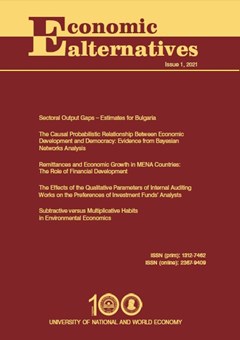Subtractive versus Multiplicative Habits in Environmental Economics
Authors: Fatma SAFI, Lobna Ben Hassen
Abstract
The present paper presents overlapping generations set-up with internal habits in consumption and the presence of environmental quality in the utility function. The modeling of habits implies that the consumer preferences are influenced not only by a household’s own current consumption, but also by their personal past consumption. Our main objective is to study and compare the impacts of first subtractive second multiplicative internal habits on the environmental quality and the capital accumulation through a comparative static behavior at the stable steady state equilibrium. By changing the way the habit is specified, we have shown that introducing habit can lead to different findings regarding the capital and the environment.

